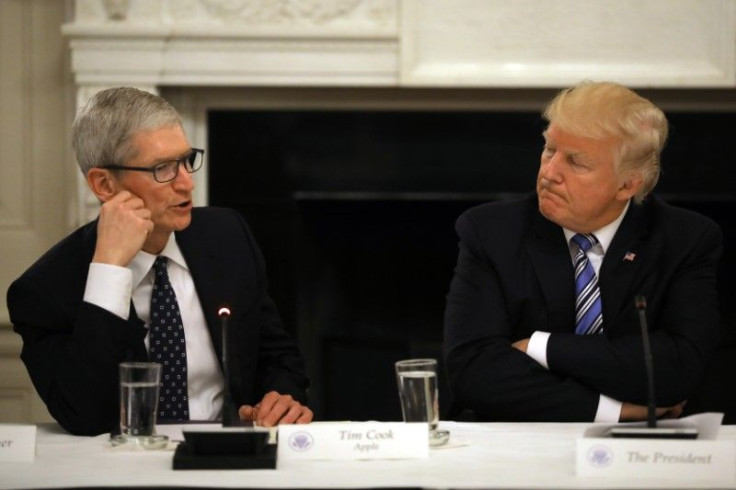During Trade War With China, Donald Trump Meets With Apple CEO Tim Cook

President Trump and Apple (APPL) CEO Tim Cook met Friday at Trump's New Jersey golf club amid tensions between the two sides over the U.S - China trade war. Apple currently has manufacturing facilities for many of its products in China.
"Having dinner tonight with Tim Cook of Apple. They will be spending vast sums of money in the U.S. Great!," Trump tweeted Friday.
Cook has met Trump five times so far this year, as Apple hopes to mitigate damage done by his trade war. In September, the Trump administration will have tariffs of 10% to 25% on virtually all Chinese goods.
Apple assembles the majority of its iPhones in Shenzhen, China, and the tech giant has multiple partners building the devices in China, such as Foxconn, which has faced controversy over its harsh work environment.
Two analysts at Wedbush Securities, Daniel Ives and Strecker Backe, have called the tariffs a "gut punch" for Apple and that it could negatively impact the company's shares by 4% in the 2020 fiscal year.
Wedbush analysts have also said that if Apple passes the tariffs onto consumers with higher prices, it would weaken iPhone demand by about 6 million to 8 million units.
Trump said last week that iPhones and Macbooks would face a temporary reprieve on the tariffs being implemented in September, with the tariffs being slapped on those goods in December. Other Apple products made in China, such as its Airpods and Apple Watch, will still have to face the tariffs in September.
Cook and Trump have had a contentious relationship. Trump in August 2017 said Cook promised him “three big, beautiful plants” would be built in the U.S., though Cook would not respond to comment and there have been no plans for such plants. In September 2017, Cook described the Trump administration's decision to phase out DACA as "unacceptable."
Trump believes the China tariffs are a way to bring back American manufacturing and counter China's cheap exports. His administration has labeled China as a "currency manipulator" and has frequently asserted that China is taking advantage of the U.S.
Some companies, such as retail giant Walmart, have struck back at the tariffs, saying that they will have to raise prices.
© Copyright IBTimes 2025. All rights reserved.





















